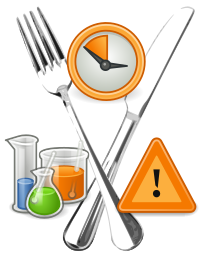
Association of Opioid-Related Adverse Drug Events With Clinical and Cost Outcomes Among Surgical Patients in a Large Integrated Health Care Delivery System
Sign Up to like & getrecommendations! Published in 2018 at "JAMA Surgery"
DOI: 10.1001/jamasurg.2018.1039
Abstract: Importance Opioids are commonly used for pain control during and after invasive procedures. However, opioid-related adverse drug events (ORADEs) are common and have been associated with worse patient outcomes. Objectives To examine the incidence of… read more here.
Keywords: opioid related; drug events; related adverse; care ... See more keywords

Categorization and association analysis of risk factors for adverse drug events
Sign Up to like & getrecommendations! Published in 2017 at "European Journal of Clinical Pharmacology"
DOI: 10.1007/s00228-017-2373-5
Abstract: PurposeAdverse drug events (ADE) are among the leading causes of morbidity and hospitalization. This review analyzes risk factors for ADE, particularly their categorizations and association patterns, the prevalence, severity, and preventability of ADE, and method… read more here.
Keywords: factors ade; risk; analysis; risk factors ... See more keywords

Hospitalizations and deaths related to adverse drug events worldwide: Systematic review of studies with national coverage.
Sign Up to like & getrecommendations! Published in 2021 at "European journal of clinical pharmacology"
DOI: 10.1007/s00228-021-03238-2
Abstract: PURPOSE Adverse drug events are related to negative outcomes in healthcare, including hospitalization, increased duration of hospital stay and death. The aim of this study was to conduct a systematic review to evaluate hospitalizations and… read more here.
Keywords: deaths related; drug events; related adverse; hospitalizations deaths ... See more keywords

Adverse Drug Events Observed with the Novel Sodium/Glucose Co-Transporter 2 Inhibitor Ipragliflozin for the Treatment of Patients with Type 2 Diabetes Mellitus: A Systematic Review and Meta-analysis of Randomized Studies
Sign Up to like & getrecommendations! Published in 2020 at "Advances in Therapy"
DOI: 10.1007/s12325-020-01471-2
Abstract: Type 2 diabetes mellitus (T2DM) is becoming a major issue worldwide. To effectively control the blood sugar of patients with T2DM, several novel oral hypoglycemic agents (OHAs) are being developed. Sodium/glucose co-transporter 2 (SGLT 2)… read more here.
Keywords: analysis; treatment; drug; type diabetes ... See more keywords

Adverse Drug Events Associated with sitagliptin Versus canagliflozin for the Treatment of Patients with Type 2 Diabetes Mellitus: A Systematic Comparison Through a Meta-Analysis
Sign Up to like & getrecommendations! Published in 2018 at "Diabetes Therapy"
DOI: 10.1007/s13300-018-0481-6
Abstract: IntroductionIn this meta-analysis, we aimed to systematically compare the adverse drug events associated with sitagliptin (100 mg) versus canagliflozin 100 or 300 mg in patients who were treated for type 2 diabetes mellitus (T2DM).MethodsOnline databases were searched… read more here.
Keywords: canagliflozin; versus canagliflozin; drug; drug events ... See more keywords

A Disproportionality Analysis of the Adverse Drug Events Associated with Lurasidone in Paediatric Patients Using the US FDA Adverse Event Reporting System (FAERS)
Sign Up to like & getrecommendations! Published in 2020 at "Drug Safety"
DOI: 10.1007/s40264-020-00928-1
Abstract: Lurasidone is a second-generation antipsychotic used in the treatment of schizophrenia and bipolar disorder [1]. An analysis to identify adverse drug events (ADEs) associated with lurasidone in children is lacking. The aim of this investigation… read more here.
Keywords: reporting; associated lurasidone; drug; drug events ... See more keywords

The Brazilian Portuguese version of the Pediatric Trigger Toolkit is applicable to measure the occurrence of adverse drug events in Brazilian pediatric inpatients.
Sign Up to like & getrecommendations! Published in 2019 at "Jornal de pediatria"
DOI: 10.1016/j.jped.2017.10.009
Abstract: OBJECTIVE To describe the process of translation, adaptation, and validation of the Brazilian Portuguese version of the Pediatric Trigger Toolkit: Measuring Adverse Drug Events in the Children's Hospital. METHODS The validation process for the research… read more here.
Keywords: brazilian portuguese; drug events; adverse drug; trigger ... See more keywords

Incidence and impact of adverse drug events contributing to hospital readmissions in kidney transplant recipients
Sign Up to like & getrecommendations! Published in 2018 at "Surgery"
DOI: 10.1016/j.surg.2017.09.027
Abstract: Background The incidence and impact of adverse drug events (ADEs) leading to hospitalization and as a predominant risk factor for late graft loss has not been studied in transplantation. Methods This was a longitudinal cohort… read more here.
Keywords: impact adverse; drug; events contributing; drug events ... See more keywords

Trigger tools to identify adverse drug events in hospitalised children: A systematic review.
Sign Up to like & getrecommendations! Published in 2022 at "Therapie"
DOI: 10.1016/j.therap.2022.01.015
Abstract: AIMS To identify all available trigger tools applicable to the pediatric population in hospital settings to detect adverse drug events (ADEs) and to describe their performances by positive predictive value (PPV). METHODS PubMed® was searched… read more here.
Keywords: tools identify; drug events; drug; trigger ... See more keywords

Extracting medications and associated adverse drug events using a natural language processing system combining knowledge base and deep learning
Sign Up to like & getrecommendations! Published in 2020 at "Journal of the American Medical Informatics Association : JAMIA"
DOI: 10.1093/jamia/ocz141
Abstract: OBJECTIVE Detecting adverse drug events (ADEs) and medications related information in clinical notes is important for both hospital medical care and medical research. We describe our clinical natural language processing (NLP) system to automatically extract… read more here.
Keywords: system; deep learning; nlp system; drug events ... See more keywords

Identifying relations of medications with adverse drug events using recurrent convolutional neural networks and gradient boosting
Sign Up to like & getrecommendations! Published in 2020 at "Journal of the American Medical Informatics Association : JAMIA"
DOI: 10.1093/jamia/ocz144
Abstract: OBJECTIVE To develop a natural language processing system that identifies relations of medications with adverse drug events from clinical narratives. This project is part of the 2018 n2c2 challenge. MATERIALS AND METHODS We developed a… read more here.
Keywords: recurrent convolutional; convolutional neural; drug events; adverse drug ... See more keywords